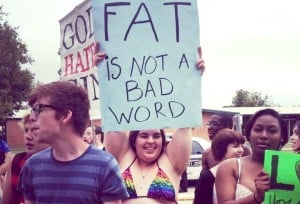
Source: Fat Belly Messages
Living as a fat person in the midst of the fatpocalypse (oops, sorry–I mean the obesity epidemic) is often difficult.
Not because I find living in my fat body difficult, but because I am often surrounded by people, messages, and media that work to ensure that I know that being fat is (supposedly) not okay.
People make all kinds of (false) assumptions about fat bodies. And I am regularly exposed to messages about my government wanting to get rid of me and bodies like mine as they engage in their war on obesity.
The privileges of being thin (that often intersect with other privileges like male privilege, white privilege, straight privilege, and cis privilege) ensure that most non-fat people give little thought (or little care) to the effects of fat stigma and shame on the lives of fat people.
There are many ways that fat individuals can manage living in the hostile environment. They can withdraw or try to become somebody more acceptable. They can work to blend in and be less noticeable. But I want to suggest doing something a little more radical: coming out as fat.
Some may suggest that it isn’t possible to come out as fat, as being fat is a visible state of being (so therefore, it is not disclosed at will). Others, however, have argued that coming out is an option for a visible stigma bearer.
For me, coming out as fat is the act of embracing your fat identity in a positive way to foster self-esteem and empowerment.
And I think that it is more than just a viable option for you – I think it can be a liberating one.
I am often asked what steps fat people can take to work towards throwing out body image dissatisfaction and constructing positive fat identities, so I’ve gathered four steps that I believe may be helpful. (For other ideas, check out this great piece by Dianne Sylvan.)
So if you’re ready to embrace your fat self, here are some places to start.
1. Invest in Full-Length Mirrors
An important part of coming out as a fat is being comfortable in your body.
This isn’t to suggest that you will love your body every day, nor should it be argued that those who still struggle on occasion with body positivity are less committed. But a general sense of self-love is a good first step.
A step toward being comfortable in your body is being familiar with it! And having full-length mirrors is a good way to start your relationship with your fat body.
I, myself, have several throughout my house, including one in the bathroom that allows me to see my naked fat body before and after bathing.
Many fat people avoid looking at their bodies, especially from the side (check out this awesome Tumblr, Fat from the Side, which works to subvert that). But if you want to be happy in your body, you need to know what your body looks like. From all angles. And in full length.
2. Own the F Word
Fat. It’s one of the “F” words.
When I call myself fat in mixed company, I’m often surrounded by panicked people. My closest friends still cringe when I call myself “Fatty.”
Most people don’t want to be called fat; they don’t really want to hear the word at all. But the word itself is simply a descriptor.
I am short. I am a ginger. I am fat. For me, this word is preferred to the alternatives.
“Overweight” is over what weight, exactly? “Fluffy” is for stuffed animals and pets. And “obese” is possibly one of the few words less adopted than fat; unsurprisingly, people don’t want to call themselves diseased.
I’ve grown up in my fat body with people trying to assure me that I am not fat — which is ridiculous because I’ve always been fat. Even as a child when I wasn’t that heavy, I was still the fattest one in my class. Ergo, the fat kid.
In my experience, what they have been trying to express to me is that they don’t associate me with the negative stereotypes we associate with fatness. They don’t see me as ugly, lazy, inactive, stupid, or lacking discipline. So learning to adopt that word as part of who I am, was a huge part of coming out as fat for me, because it’s a radical step toward eradicating the assumed relationship between fat bodies and negative attributes.
Owning the “F” word is all about practice – and it isn’t for everyone. If it makes you uncomfortable, it’s important to think about why that is, but I’m not asking you to reclaim a word if it’s too triggering for you.
But if you want to forge forward, the more you say it, the more comfortable you will get with it. And when you do say it, say it without shame. Teach yourself that it’s not a bad word and doesn’t mean that you’re a less valuable person.
If you want to get really adventurous, purchase a ”Fat” necklace from Fancy Lady Industries. I’ve got the necklace in at least ten different colors. The first time I wore one in public, was on a trip to Auckland. I was very conscious that I was walking through an airport in the largest city in New Zealand with the word “Fat” across my chest. But you know what? No one harassed me; I didn’t even get any glares. I did, however, feel really great at the end of the day.
3. Speak Up
Fat hatred is pervasive in our culture, and fat-shaming is common. An important part of taking pride in yourself is rejecting that others have the right to demean or diminish you.
Feminists are said not to have a sense of humor, because we aren’t happy just to sit and laugh at offensive things. Some want to suggest that it’s my problem if I take offence to a joke; they may accuse me of having a PC kneejerk reaction.
But here’s the thing: When someone makes a joke about fat people, they’re contributing to the hostile world that fat people live in. And as a fat person, I’m not okay with that.
So I speak up.
I may be considered “no fun,” but at least I’m not actively participating in the oppression of myself and other fat people.
Don’t support media outlets that profit off of fat-shaming. Don’t sit quietly when a group of friends are engaging in fat talk.
You have the right to speak up. Or if that’s a bit too confrontational for you, leave the room. You have the right to not participate in your own dehumunization.
4. Look for Ways You Can Queer Fatness
Once you start to reject the fat “dos” and “don’ts’” of the culture, you may begin to explore how you want your fat body to look, act, and engage with others.
To queer fatness means to thwart what is expected, to deviate from the norm.
Perhaps you want to try your hand at burlesque. Maybe you’ve always dreamed of being in a synchronized swimming troupe. Do it!
And if you want to learn more about how to queer fatness, or how fatness queers, check out the new edited collection from Ashgate, Queering Fat Embodiment. It includes great material on fashion, disability, activism, and gender, among other topics.
***
Coming out as fat is not for everyone, nor is it a one-time thing. And coming out is not a safe choice for all situations.
But some fat people may find that coming out as fat is a way to construct a positive fat identity and live a life less encumbered by fat stigma.
Are you out as fat? Share your story with us below!
[do_widget id=”text-101″]
Cat Pausé, PhD (@FOMNZ) is a Fat Studies Researcher and Lecturer in Human Development at Massey University, New Zealand. Her research focuses on the construction, revision, and maintenance, of spoiled identities and the effects on health and well-being of fat individuals. She is a co-editor of Queering Fat Embodiment (Ashgate, 2014), and has published in Feminist Review, Somatechnics, and Narrative Inquiries in Bioethics. Cat hosted the ‘Fat Studies: Reflective Intersections’ conference in New Zealand (2012), and guest edited an issue on intersectionality for Fat Studies: An Interdisciplinary Journal of Body Weight and Society. Her work has been featured on The Huffington Post, Yahoo, NPR, Radio New Zealand, The Daily Mail, and 20/20. Cat engages in the fatosphere through her blog, Tumblr, and podcast, Friend of Marilyn.
Search our 3000+ articles!
Read our articles about:
Our online racial justice training
Used by hundreds of universities, non-profits, and businesses.
Click to learn more
Most Read Articles
- « Previous
- 1
- …
- 30
- 31
- 32



















